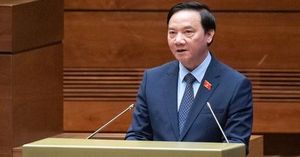Luc Lavoie, a prominent political columnist for TVA, was arrested on December 8 at his residence in Saint-Lambert, igniting controversy and speculation about his future. The incident stemmed from allegations of harassment and potential break-in related to personal disputes with a woman known to him. This unexpected arrest is expected to have significant ramifications not only for Lavoie but also for Quebecor, the parent company of TVA, which is led by CEO Pierre-Karl Péladeau.
The background to Lavoie’s arrest lies within the already strained relations between him and Péladeau, particularly over the contentious issue of reviving the Quebec Nordiques hockey franchise, Péladeau’s pet project. Lavoie has been public about his skepticism, arguing during various segments on TVA, "Quebecor cannot wake up one morning and say: I'm going to put $1.1 billion on the table to pay for a license and have a hockey team. They'll close down, they'll go bankrupt." This statement highlights the economic strain such ventures could impose on the community, emphasizing his belief the region lacks sufficient resources to support such initiatives.
Péladeau, on the other hand, remains vehemently optimistic, often repeating his commitment to bring back the Nordiques, claiming, "We have a world-class arena and a passionate fanbase. With solid partners, it's a feasible project." The stark difference between their views has created palpable tension, setting the stage for potential repercussions following Lavoie's recent actions.
According to reports from La Presse, the arrest resulted from police intervention after receiving reports of a dispute involving Lavoie and the woman, aged 54. It is alleged Lavoie harassed her over several days leading up to the incident, which escalated to his nocturnal appearance at her residence. While he was released under conditions requiring him to return to court, the charges of introduction by breach and criminal harassment hang heavy as the investigation continues. MELANIE Mercier, spokesperson for the Service de police de l’agglomération de Longueuil, addressed the seriousness with which such cases are treated, stating, "We handle all criminal harassment cases with the utmost seriousness."">
Following his arrest, Lavoie's legal representation expressed disbelief at the turn of events, issuing a statement indicating their client viewed the incident as "a regrettable personal situation gone awry, transitioning unexpectedly to a criminal complaint." They assert Lavoie intends to defend himself vigorously against these accusations.
While Lavoie expectedly distanced himself from any claims of domestic violence, the situation has nevertheless placed both him and TVA under considerable public scrutiny. Lavoie has not participated in broadcasts since the incident, highlighting the potential ramifications this could have on his career and the company's reputation. Given the existing atmosphere, observers note it may not be long before Péladeau seizes the opportunity to part ways with Lavoie, whose public demeanor has been viewed as increasingly counterproductive to the company’s ambitions.
An unnamed source within Quebecor reportedly stated, "Lavoie has become a strain on the company's image. Péladeau was simply waiting for any excuse to get rid of him." Amidst the current backdrop of labor unrest, highlighted by impending lockouts of many employees at TVA, internal opinions suggest Lavoie’s continuing vocal criticism against the Nordiques project undermines company ethos and distractions from pressing agendas.
This tension is heightened by recent efforts spearheaded by Péladeau to rally support for bringing back the Nordiques, which is perceived as both his vision and goal. Within this volatile mix, Lavoie's sharp analysis of the project directly contradicts Péladeau’s optimistic assertions, steering the employees' focus away from shared aspirations to what some might deem sabotaging dissent.
While Lavoie has built his reputation as a staunch critic and political analyst, it is becoming increasingly untenable for Péladeau to maintain the status quo. The harmony at TVA is at risk as the conflict between these two influential figures becomes more pronounced. If Péladeau acts and fires Lavoie, it could send ripples across the Quebec media industry, illustrating Péladeau’s unwavering stance on public loyalty to his dream of NHL hockey returning to Quebec City.
Observers of the Quebec media scene reflect on the gravity of the circumstances. This incident marks not merely Lavoie’s arrest, but could serve as the tipping point within Quebecor, signaling Péladeau's readiness to crush dissent within his ranks. The conflict is starkly representative of broader narratives at play, raising questions about media integrity, corporate loyalty, and the price of dissent within such competitive landscapes.
With the potential for disciplinary actions still looming, the future of Luc Lavoie at TVA sits precariously on the edge. If terminated, this chapter would not only dissolve his contentious relationship with Péladeau but also close the curtain on Lavoie's controversial yet influential voice within the public sphere of Quebec politics. Onlookers now await to see how the tides turn as the investigation progresses and whether this public quarrel will reach its zenith or fizzle out.



